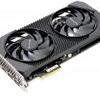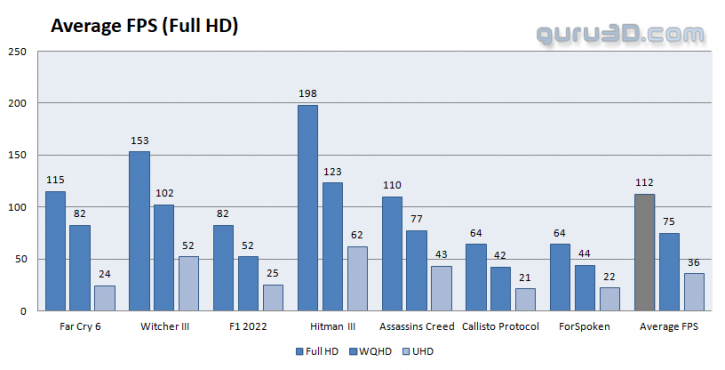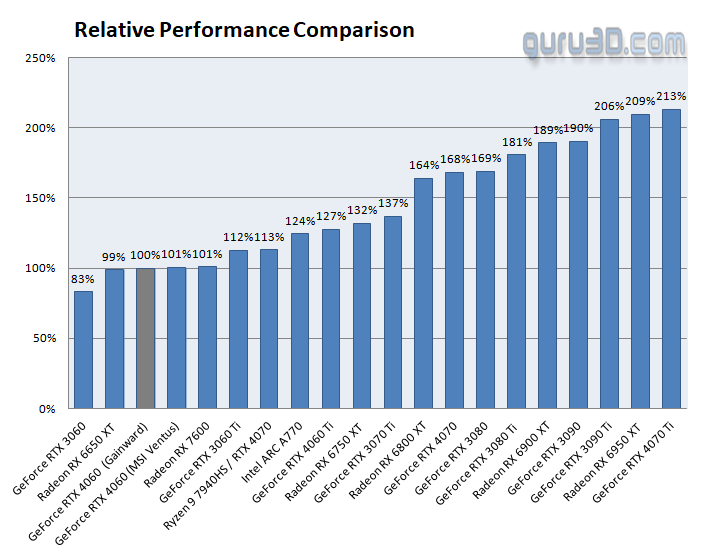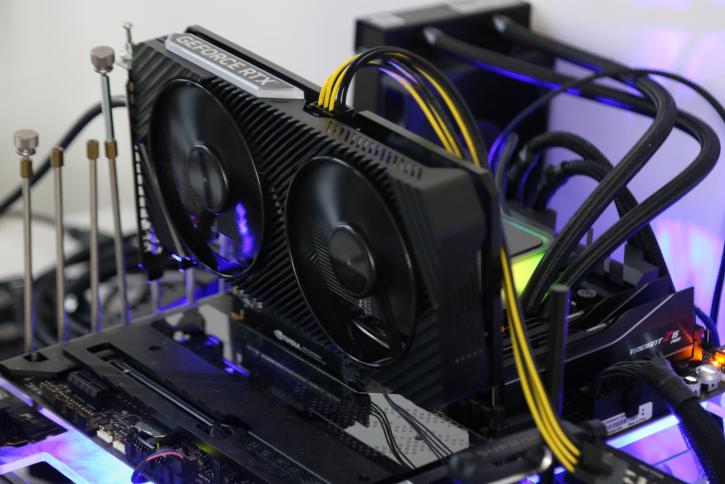Final words and conclusion
Final words
The Gainward GHOST has MSRP written all over it. Reference performance, and performance within a 1% margin. Consequently, the performance profile of this product mirrors that of the founders edition. However, the Gainward GHOST exhibits commendable capabilities, with reasonable performance in Full HD resolution it performs relatively silent and cool. NVIDIA promoted the product with a predominantly focus on DLSS3, and there was a thought flaw from NVIDIA; supersampling from a lower resolution toward Full HD isn't that good for image quality. That, combined with the fact that frame generation can eat away 10-20% of your VRAM, also makes 8GB a relatively poor choice. It's noticeable that NVIDIA seems to lean more heavily towards DLSS3 and Frame generation technologies. This shift towards AI-centric solutions to boost performance calls for a level of caution. Unfortunately for the 4060 8GB, things aren't looking any different; performance went down, DLSS3 is a bit of a soar point at this resolution, AI Frame generation uses VRAM, and still, this product with a limited 128-bit wide memory bus sits around the $300 marker. This product should have been priced at $199-$249, but unfortunately, we do not make that call, eh? So the pricing of this card is steep, it does offer a reasonable Full HD experience, though. With its 24L2 cache, it assures suitable performance for the given monitor resolution (until that cache dries out of course). DLSS remains debatable, frame generation as its own tech, however, is commendable. Performance variability may be seen in scenarios with less CPU dependence. In the context of ray tracing performance, the RTX 4000 outperforms the Radeon Series 600/7000, suggesting substantial progress in this domain.
Performance
The GeForce RTX 4060 graphics card delivers useful gaming performance and good rendering quality overall at a Full HD resolution. At full HD, modern games will manage 60+ FPS, with older titles easily reaching 100 fps on average. Next, we'll proceed with a comparison to compare with other cards.
| Graphics card | Boost Frequency (MHz |
| Gainward GeForce 4060 GHOST | 2460 |
| MSI GeForce 4060 Ventus 2x | 2490 |
| ASUS Dual GeForce RTX 4060 OC | 2505 |
| MSI GeForce 4060 Gaming X | 2595 |
Overall, the GeForce RTX 4060 8GB makes sense at resolutions as high as 1920x1080/1200 and sometimes up to WQHD if you use a DLSS assist, frame generation will help, but again at the valuable cost of VRAM utilization. The card is 18% faster than the RTX 3060 but almost 25% slower than the 4060 Ti.
Cooling & noise levels
When operating at full load, the graphics card has a TGP power consumption of just under 105-115 watts with an average at ~111 as measured by us. This power usage is directly linked to the amount of heat generated by the GPU, which is enclosed within a sealed structure. In terms of noise levels, the card produces 38 dBA.
During demanding tasks, the card's temperature may reach around 65-70°C. It's important to note that this temperature can vary depending on the efficiency of the airflow within the computer case. Our FLIR imaging analysis indicates no cause for concern regarding heat dissipation.
Coil whine
Any graphics card can exhibit coil squeal. It's just a matter of how much exactly. For this model at a level you can barely hear when you hit high framerates. In a closed chassis, that noise would fade away in the background. For this particular card, we've hardly been able to notice it.
Pricing
NVIDIA has introduced this new graphics card priced at $299, which does not bring affordability back to the market. This price point is reminiscent of the 3060 (Ti), indicating a shift from the inflated prices seen during the cryptocurrency mining era. Although the prices have remained higher than expected for unknown reasons, the card offers okay performance for Full HD resolution.
- GeForce RTX 4060 Ti 8GB: Will be available from May 24 for $399 USD
- GeForce RTX 4060 Ti 16GB: Will be released in July for $499 USD
- GeForce RTX 4060 8GB: Will also be released in June for $299 USD
Tweaking
You can enhance your GPU's performance by fine-tuning the clock frequency and memory speed. A clock frequency increase of approximately +200 MHz is possible with a bit of added voltage. Consequently, you can anticipate your GPU boost clock frequency around the 3000 MHz range, contingent on the dynamic frequencies of different game titles, furthermore, by modifying the memory speed to 20 Gbps. Accumulated, you can expect a 7-10% performance improvement in demanding GPU scenarios compared to the reference (baseline) performance.
Conclusion
As a Full HD card, the card works out well. But as an upgrade, the 4060 series remains to be a hard sell. The new 4060 8GB is an entry-level to mainstream card. NVIDIA, however, barely gave it enough shading horsepower and leans too much on dependencies like DLSS3 and Frame generation. While we like these technologies, DLSS does not work out well, specifically in 1920x1080 and lower as the engine learns and upsamples from lower resolution content (less data to work with). That will inevitably degrade image quality. Frame generation we like very much, but here again the choice in 8GB is an inadequate one, considering frame generation will at away in that graphics memory budget as well, leaving even less to work with. To compensate for that and when factoring in the narrow 128-bit wide memory bus, NVIDIA added 24MB of cache. That cache works out great until it dries out and cache misses kick in. Then the card will drop down in performance big time and things become a stuttery mess. If this card had been $199 then these would have been acceptable compromises; however, at $299, my eyebrowes frown a bit. I mentioned this before; we raise serious concerns as to what is happening with the PC Gaming graphics card market, as graphics cards (and PC components) are getting too expensive. Loads of end-users will flee towards consoles ar streaming services, so defacto, this market is slowly destroying itself. Ultimately, the GeForce 4060 delivers just enough performance to justify Full HD gaming. The Gainward GHOST delivers acceptable overclocking performance in a compact form factor. The design of the GHOST edition emphasizes thermal efficiency and relatively low noise output, contributing to its commendable energy efficiency. The initial MSRP of $299, however, might limit the market reach of this product.
- Download NVIDIA GeForce drivers
- Sign up to receive a notification when we publish a new article.
- Or go back to Guru3D's front page
- Hilbert, LOAD"*",8,1.





